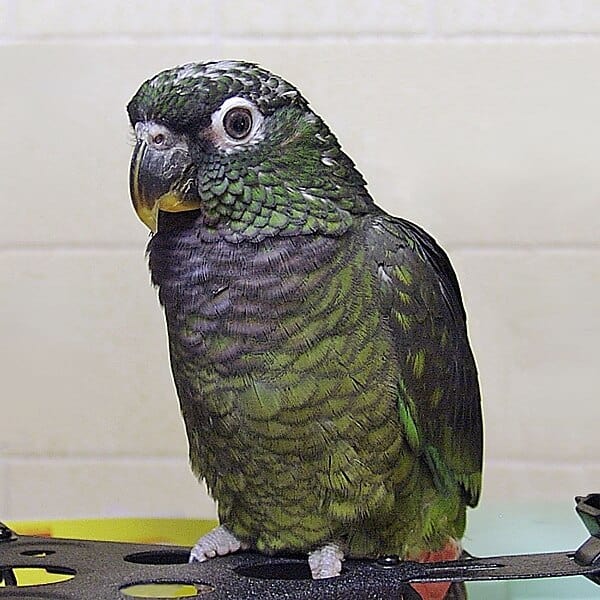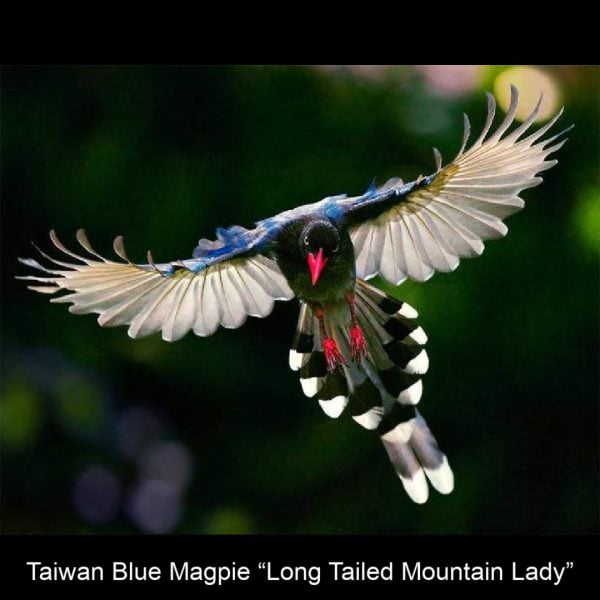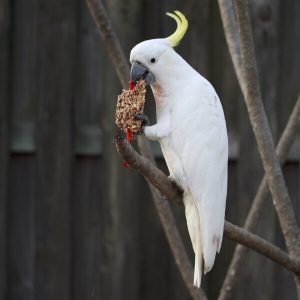Last Updated on by Catherine Tobsing
Maximilian’s Pionus (above)
All the Characteristics of a Pionus Parrot and Its Subspecies
Pionus parrots are an incredibly fascinating group of birds, known for their gentle demeanor, striking colors, and quiet nature compared to other parrots. These medium-sized parrots are native to Central and South America, where they inhabit a range of forested areas.
Below, we will dive deep into their characteristics and explore the various subspecies, helping you understand what makes each one special.
Physical Characteristics of Pionus Parrots
One of the defining characteristics of Pionus parrots is their compact, medium size.
Generally, they range from 10 to 12 inches in length, and their weight can vary between 200 to 300 grams depending on the species. Despite being medium-sized, they are quite stocky, with a short tail and broad wings.
Plumage and Coloration
Pionus parrots display a wide variety of colors, though they are not as vividly colored as other parrots like macaws or conures. However, they are still striking in their own way. Most species possess a blue tinge on their feathers, with other colors such as greens, whites, and bronzes blending in subtly.
A unique feature of Pionus parrots is the bare, fleshy ring around their eyes, known as the periophthalmic ring, which is typically white and contrasts with their feathers.
Behavioral Traits of Pionus Parrots
Pionus parrots are well-known for their calm, even-tempered demeanor. While they are curious and playful, they are not as hyperactive as other parrots like African greys or Amazons. This makes them ideal for bird lovers who want a companion without the intense energy.
They are intelligent birds, capable of learning tricks, recognizing voices, and forming strong bonds with their owners. However, they are more independent than some of their parrot cousins, which means they do not demand constant attention but still enjoy social interaction.
Vocalization and Communication
When it comes to noise, Pionus parrots are known for being relatively quiet. While they can chirp, squawk, and produce the occasional loud noise, they do so far less frequently than other parrots. Their vocalizations are often described as soft chatter rather than piercing screams.
Although they are capable of mimicking human speech, they are not the most talented talkers in the parrot family. Some Pionus parrots can pick up a few words or phrases, but it is their body language and expressions that speak volumes.
Diet and Nutritional Needs
In the wild, Pionus parrots feed on a variety of seeds, fruits, flowers, and occasional insects. As pets, they require a balanced diet consisting of high-quality pellets, fresh fruits, vegetables, and the occasional seed mix.
It is important to avoid foods high in fat and sugar, as Pionus parrots are prone to weight gain and related health issues. Offering them a diverse diet that mimics their natural eating habits will help them live long, healthy lives.
Lifespan and Health Considerations
Pionus parrots can live for 25 to 30 years when properly cared for, and some may even live beyond that. However, like any pet, they are susceptible to certain health issues such as respiratory problems, obesity, and vitamin deficiencies.
Regular vet check-ups, a proper diet, and a clean environment can go a long way in ensuring a Pionus parrot stays healthy.
Pionus Parrots’ Temperament
Affectionate but not overly clingy, Pionus parrots strike a balance between being social and independent. They enjoy spending time with their human family but can entertain themselves when necessary.
This makes them a good choice for people who might not have the ability to be with their pet every minute of the day. Their friendly disposition and relative quietness also make them great pets for **apartment dwellers** or families who prefer a more laid-back companion.
Housing and Environment Needs
Pionus parrots require a spacious cage, ideally 30×20 inches or larger, to allow for movement and wing stretching. They enjoy toys that provide mental stimulation and encourage exercise. Chewable toys, ropes, and swings are ideal as they mimic natural behaviors such as foraging and climbing.
Exercise and Play Requirements
Pionus parrots need daily exercise to maintain their physical and mental health. Allowing them at least a few hours outside their cage to fly around or interact with toys is important. Interactive playtime with their owner is also key to keeping them engaged and happy.
Subspecies of Pionus Parrots
There are several subspecies of Pionus parrots, each with unique traits while maintaining the general characteristics of the species.
Blue-Headed Pionus (Pionus menstruus)
Physical Description:
The Blue-Headed Pionus is perhaps the most recognizable of the subspecies, with a vibrant blue head and neck contrasting against a green body.
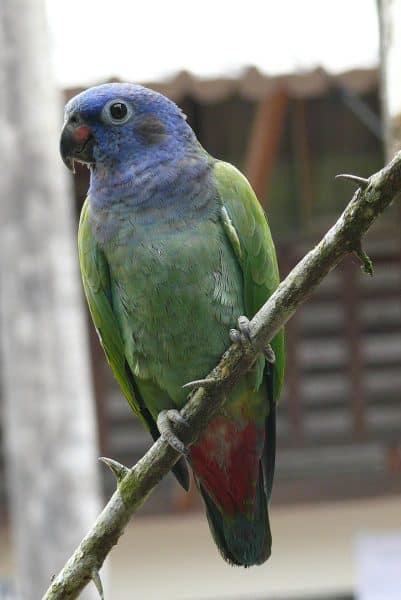
Behavior and Personality Traits:
They are known for their affectionate nature and tend to bond strongly with their owners. They are relatively quiet and make excellent companions for first-time bird owners.
White-Capped Pionus (Pionus senilis)
Physical Description:
As the name suggests, this species has a white cap of feathers on its head, with a mostly green body and a splash of red on the lower abdomen.
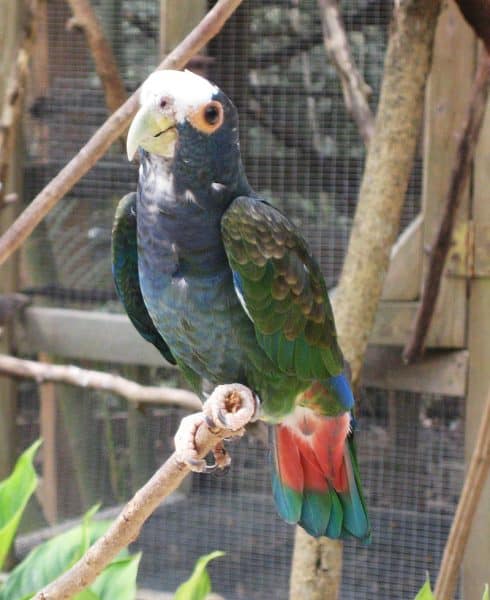
White capped pionus
Behavior and Personality Traits:
The White-Capped Pionus is slightly more energetic than other subspecies but remains friendly and manageable.
Bronze-Winged Pionus (Pionus chalcopterus)
Physical Description:
The Bronze-Winged Pionus features stunning bronze or coppery wing feathers, with a mostly dark body and blue hues around the neck.
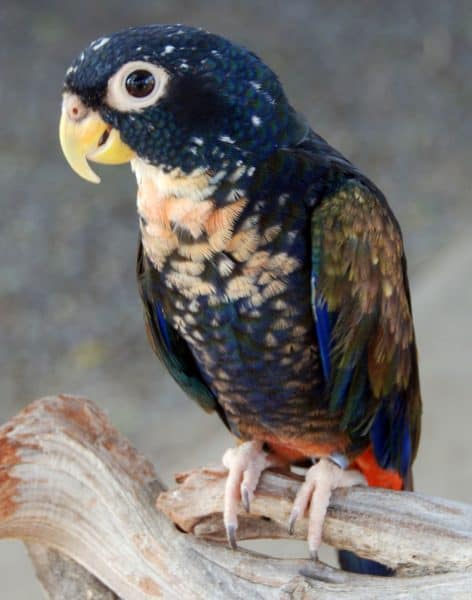
Bronze-Winged Pionus
Behavior and Personality Traits:
This subspecies is known for its independence and is a bit more reserved than others, but they can form strong bonds with their human companions.
Dusky Pionus (Pionus fuscus)
Physical Description:
The Dusky Pionus has more subdued colors, with mostly dark gray or brown plumage and a slight blue tinge on its underparts.
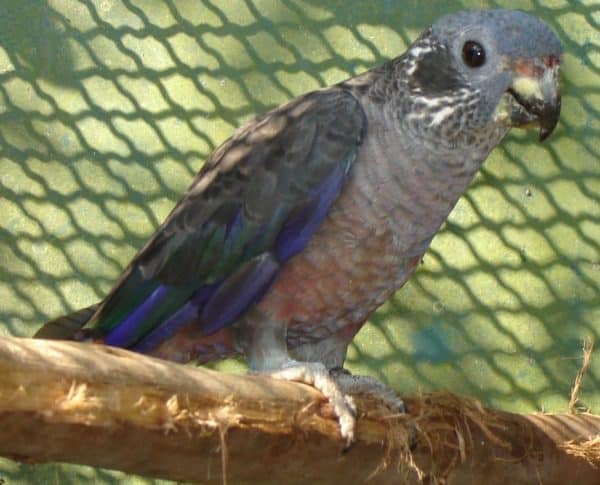
Dusky Pionus
Behavior and Personality Traits:
They are generally more introverted, preferring the company of their owners over other birds but still have a friendly disposition.
Conclusion
Pionus parrots are a delightful option for anyone looking for a bird that is intelligent, affectionate, and relatively easy to care for. With their calm nature, modest vocalization, and long lifespan, they make excellent companions for families, singles, or even apartment dwellers. Each subspecies adds its own flavor to the Pionus family, making them a versatile group of birds with unique personalities.
FAQs
- What is the best diet for a Pionus parrot?
A balanced diet of high-quality pellets, some seeds and nuts, fresh fruits and vegetables is ideal for a Pionus parrot.
- Are Pionus parrots good for beginners?
Yes, their calm nature and low-maintenance personality make them suitable for beginners.
- How can I keep my Pionus parrot entertained?
Provide plenty of toys, time outside the cage, and interactive playtime to keep them stimulated.
- How long do Pionus parrots live?
With proper care, they can live for 25 to 30 years, and sometimes even longer.
- Do Pionus parrots need a lot of attention?
They enjoy interaction but are also quite independent, making them suitable for owners with varying schedules.
Written by Mitch Rezman and the Windy City Parrot Content Team.
Author Profile
Latest entries
 Feeding Exotic BirdsDecember 29, 2025How to Switch or Convert Your Bird From Seeds to Pellets: Real-Life Case Studies and Practical Guidance
Feeding Exotic BirdsDecember 29, 2025How to Switch or Convert Your Bird From Seeds to Pellets: Real-Life Case Studies and Practical Guidance Feeding Exotic BirdsDecember 16, 2025A Practical, Budget-Smart Guide to Feeding Birds Well
Feeding Exotic BirdsDecember 16, 2025A Practical, Budget-Smart Guide to Feeding Birds Well Bird EnviornmentsDecember 7, 2025Understanding Budgie Cage Bar Orientation: Myths, Realities & Practical Solutions for Vertical-Bar Bird Cages
Bird EnviornmentsDecember 7, 2025Understanding Budgie Cage Bar Orientation: Myths, Realities & Practical Solutions for Vertical-Bar Bird Cages Feeding Exotic BirdsDecember 5, 2025How Dr. T.J. Lafeber Rewrote the Future of Pet Bird Nutrition
Feeding Exotic BirdsDecember 5, 2025How Dr. T.J. Lafeber Rewrote the Future of Pet Bird Nutrition
